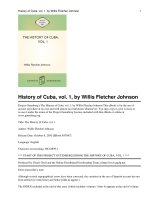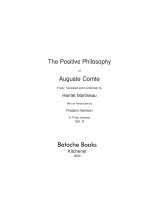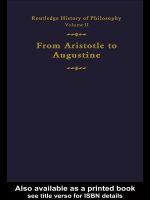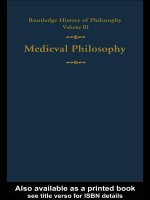- Trang chủ >>
- Khoa Học Tự Nhiên >>
- Vật lý
routledge history of philosophy vol ii from aristotle to augustine - david furley
Bạn đang xem bản rút gọn của tài liệu. Xem và tải ngay bản đầy đủ của tài liệu tại đây (3 MB, 484 trang )
Routledge History of Philosophy
Volume II
This volume provides a comprehensive survey of the work of
philosophers who wrote in Greek and Latin from the mid-fourth century
BC to the fifth century AD—from the death of Plato to the beginning of
Christian philosophy.
Five chapters are devoted to Aristotle and the Peripatetic school, three to
the major Hellenistic schools—the Epicurean, Stoic and the Sceptic—two to
the arguments of mathematicians and biologists, and one each to Neo-
Platonism and Augustine.
Supplemented with a chronology, a glossary of technical terms and an
extensive bibliography, Volume II of the Routledge History of Philosophy
provides a comprehensive and user-friendly survey and analysis of the
methods and achievements of post-Platonic Classical philosophers.
David Furley is Professor of Classics, Emeritus, at Princeton University,
and an Honorary Fellow of Jesus College Cambridge. He is the author of
Cosmic Problems: Essays on Greek and Roman Philosophy of Nature
(1989). He was Editor of Phronesis (1968–72) and he was elected
Corresponding Fellow of the British Academy in 1990.
Routledge History of Philosophy
General Editors—G.H.R.Parkinson and S.G.Shanker
The Routledge History of Philosophy provides a chronological survey of the
history of Western philosophy, from its beginnings in the sixth century BC
to the present time. It discusses all major philosophical developments in
depth. Most space is allocated to those individuals who, by common
consent, are regarded as great philosophers. But lesser figures have not
been neglected, and together the ten volumes of the History include basic
and critical information about every significant philosopher of the past and
present. These philosophers are clearly situated within the cultural and, in
particular, the scientific context of their time.
The History is intended not only for the specialist, but also for the
student and the general reader. Each chapter is by an acknowledged
authority in the field. The chapters are written in an accessible style and a
glossary of technical terms is provided in each volume.
Each volume contains 10–15 chapters by different contributors
I From the Beginning to Plato
C.C.W.Taylor (published 1997)
II From Aristotle to Augustine
David Furley
III Medieval Philosophy John
Marenbon
IV The Renaissance and 17th-century
Rationalism
G.H.R.Parkinson (published
1993)
V British Philosophy and the Age
of Enlightenment
Stuart Brown (published 1996)
VI The Age of German Idealism
Robert Solomon and Kathleen
Higgins (published 1993)
VII The Nineteenth Century
C.L.Ten (published 1994)
VIIIContinental Philosophy in the
20th Century Richard Kearney
(published 1993)
IX Philosophy of Science,Logic and
Mathematics in the 20th Century
S.G.Shanker (published 1996)
X Philosophy of Meaning,
Knowledge and Value in the
20th Century
John Canfield (published 1997)
Routledge History of
Philosophy
Volume II
From Aristotle to Augustine
EDITED BY
David Furley
London and New York
First published 1999
by Routledge
11 New Fetter Lane, London EC4P 4EE
This edition published in the Taylor & Francis e-Library, 2005.
“To purchase your own copy of this or any of Taylor & Francis or Routledge’s
collection of thousands of eBooks please go to www.eBookstore.tandf.co.uk.”
Simultaneously published in the USA and Canada
by Routledge
29 West 35th Street, New York, NY 10001
© 1999 Selection and editorial matter David Furley;
individual contributions, the contributors
The right of David Furley to be identified as the Author of this
Work has been asserted by him in accordance with the Copyright,
Designs and Patents Act 1988
All rights reserved. No part of this book may be reprinted or
reproduced or utilised in any form or by any electronic,
mechanical, or other means, now known or hereafter
invented, including photocopying and recording, or in any
information storage or retrieval system, without permission in
writing from the publishers.
British Library Cataloguing in Publication Data
A catalogue record for this book is available from the British Library
Library of Congress Cataloging in Publication Data
From Aristotle to Augustine/edited by David Furley.
p. cm.—(Routledge history of philosophy; v. 2)
Includes bibliographical references and index.
ISBN 0-415-06002-8 (HB)
1. Philosophy, Ancient. 2. Aristotle. 3. Augustine, Saint,
Bishop of Hippo. I. Furley, David J. II. Series.
B505.F76 1999
180–dc21 98–8543
CIP
ISBN 0-203-02845-7 Master e-book ISBN
ISBN 0-203-05817-8 (Adobe eReader Format)
ISBN 0-415-06002-8 (Print Edition)
Contents
General editors’ preface vii
Notes on contributors ix
Chronology xii
List of sources xix
Introduction
David Furley
1
1 Aristotle the philosopher of nature
David Furley
9
2 Aristotle’s logic and metaphysics
Alan Code
40
3 Aristotle: Aesthetics and philosophy of mind
David Gallop
76
4 Aristotle: Ethics and politics
Roger Crisp Trevor J.Saunders
109
5 The Peripatetic school
Robert W.Sharples
147
6 Epicureanism
Stephen Everson
188
7 Stoicism
Brad Inwood
222
8 The sceptics
Michael Frede
253
9 The exact sciences in Hellenistic times: Texts and issues
Alan C.Bowen
287
10 Hellenistic biological sciences
R.J.Hankinson
320
nd
a
11 Neo-Platonism
Eyjólfur K.Emilsson
357
12 Augustine
Gerard O’Daly
389
Glossary 430
Name index 434
Subject index 441
Index locorum 451
vi
General editors’ preface
The history of philosophy, as its name implies, represents a union of two
very different disciplines, each of which imposes severe constraints upon
the other. As an exercise in the history of ideas, it demands that one
acquire a ‘period eye’: a thorough understanding of how the thinkers whom
it studies viewed the problems which they sought to resolve, the conceptual
frameworks in which they addressed these issues, their assumptions and
objectives, their blind spots and miscues. But as an exercise in philosophy,
we are engaged in much more than simply a descriptive task. There is a
crucial critical aspect to our efforts: we are looking for the cogency as
much as the development of an argument, for its bearing on questions
which continue to preoccupy us as much as the impact which it may have
had on the evolution of philosophical thought.
The history of philosophy thus requires a delicate balancing act from its
practitioners. We read these writings with the full benefit of historical
hindsight. We can see why the minor contributions remained minor and
where the grand systems broke down: sometimes as a result of internal
pressures, sometimes because of a failure to overcome an insuperable
obstacle, sometimes because of a dramatic technological or sociological
change and, quite often, because of nothing more than a shift in
intellectual fashion or interests. Yet, because of our continuing
philosophical concern with many of the same problems, we cannot afford
to look dispassionately at these works. We want to know what lessons are
to be learnt from the inconsequential or the glorious failures; many times we
want to plead for a contemporary relevance in the overlooked theory or to
reconsider whether the ‘glorious failure’ was indeed such or simply ahead of
its time: perhaps even ahead of its author.
We find ourselves, therefore, much like the mythical ‘radical translator’
who has so fascinated modern philosophers, trying to understand an
author’s ideas in his and his culture’s eyes, and at the same time, in our
own. It can be a formidable task. Many times we fail in the historical
undertaking because our philosophical interests are so strong, or lose sight
of the latter because we are so enthralled by the former. But the nature of
philosophy is such that we are compelled to master both techniques. For
learning about the history of philosophy is not just a challenging and
engaging pastime: it is an essential element in learning about the nature of
philosophy—in grasping how philosophy is intimately connected with and
yet distinct from both history and science.
The Routledge History of Philosophy provides a chronological survey of
the history of Western philosophy, from its beginnings up to the present
time. Its aim is to discuss all major philosophical developments in depth,
and with this in mind, most space has been allocated to those individuals
who, by common consent, are regarded as great philosophers. But lesser
figures have not been neglected, and it is hoped that the reader will be able
to find, in the ten volumes of the History, at least basic information about
any significant philosopher of the past or present.
Philosophical thinking does not occur in isolation from other human
activities, and this History tries to situate philosophers within the cultural,
and in particular the scientific, context of their time. Some philosophers,
indeed, would regard philosophy as merely ancillary to the natural
sciences; but even if this view is rejected, it can hardly be denied that the
sciences have had a great influence on what is now regarded as philosophy,
and it is important that this influence should be set forth clearly. Not that
these volumes are intended to provide a mere record of the factors that
influenced philosophical thinking; philosophy is a discipline with its own
standards of argument, and the presentation of the ways in which these
arguments have developed is the main concern of this History.
In speaking of ‘what is now regarded as philosophy’, we may have given
the impression that there now exists a single view of what philosophy is.
This is certainly not the case; on the contrary, there exist serious
differences of opinion, among those who call themselves philosophers,
about the nature of their subject. These differences are reflected in the
existence at the present time of two main schools of thought, usually
described as ‘analytic’ and ‘continental’ philosophy. It is not our intention,
as general editors of this History, to take sides in this dispute. Our attitude
is one of tolerance, and our hope is that these volumes will contribute to an
understanding of how philosophers have reached the positions which they
now occupy.
One final comment. Philosophy has long been a highly technical subject,
with its own specialized vocabulary. This History is intended not only for
the specialist but also for the general reader. To this end, we have tried to
ensure that each chapter is written in an accessible style; and since
technicalities are unavoidable, a glossary of technical terms is provided in
each volume. In this way these volumes will, we hope, contribute to a
wider understanding of a subject which is of the highest importance to all
thinking people.
G.H.R.Parkinson
S.G.Shanker
viii
Notes on contributors
Alan C.Bowen is the Director of the Institute for Research in Classical
Philosophy and Science (Princeton). He has published numerous articles
on the history of ancient science and is currently writing a book, Greco-
Latin Planetary Theory before Ptolemy: History and Historiography.
Alan Code is Nicholas C.Petris Professor of Greek Studies at the
University of California at Berkeley. Until recently he was O’Donnell
Professor of Philosophy at the Ohio State University. He is the author of
many articles on Aristotle’s metaphysics, logic, philosophy of mind and
philosophy of nature.
Roger Crisp is Fellow and Tutor in Philosophy at St Anne’s College
Oxford. He is the editor of Utilitas. In addition to articles on Aristotle,
and contributions to modern problems in moral philosophy, he has
published Mill on Utilitarianism (Routledge, 1997), and is translating
Aristotle’s Nicomachean Ethics for Cambridge University Press’s History
of Philosophy series.
Eyjólfur K.Emilsson received his PhD degree from Princeton University,
and then became a Fellow in the Institute of Philosophy at the University
of Iceland. He now teaches in the Philosophy Department of the
University of Oslo. His book Plotinus on Sense-Perception: A
Philosophical Study was published by Cambridge University Press in
1988.
Stephen Everson is the author of Aristotle on Perception (1997), as well
as articles on Aristotle and Epicurus. He is currently a member of the
Department of Philosophy at the University of Michigan.
Michael Frede is Professor of Ancient Philosophy at the University of
Oxford. He is the author of Die stoische Logik (1974), Galen: Three
Treatises on the Nature of Science (1985) and Essays in Ancient
Philosophy (1987), and has published many other papers on ancient
philosophy and medicine.
David Furley is Professor of Classics, Emeritus, at Princeton University,
and an Honorary Fellow of Jesus College Cambridge. He is the author of
Two Studies in the Greek Atomists (1967), The Greek Cosmologists vol.
1 (1987), and Cosmic Problems: Essays on Greek and Roman Philosophy
of Nature (1989). He was Editor of Phronesis (1968–72), and Joint
Editor with R.E. Allen of Studies in Presocratic Philosophy I (1970) and
II (1975). He was elected Corresponding Fellow of the British Academy
in 1990.
David Gallop is Professor of Philosophy, Emeritus, at Trent University,
Ontario, where he taught from 1969 to 1989. His publications include
numerous articles on philosophical and literary subjects. He has
translated and edited Plato’s Phaedo for the Clarendon Press series
(1975), as well as Euthyphro, Defence of Socrates, Crito, and Phaedo
for World’s Classics (1993, 1997). He has also published Parmenides of
Elea (Toronto, 1984) and Aristotle on Sleep and Dreams (Warminster,
1996).
R.J.Hankinson is Professor of Philosophy at the University of Texas at
Austin. He is the author of many articles on the philosophical thought of
Hellenistic and later Greek biologists. His book Galen on Antecedent
Causes was published by Cambridge University Press in 1994.
Brad Inwood is Professor of Classics, University of Toronto. He is the
author of Ethics and Human Action in Early Stoicism (1985), Hellenistic
Philosophy: Introductory Readings with L.P.Gerson (1988, 2nd,
expanded edition, 1997), and The Poem of Parmenides (1992). He is co-
editor, with Jaap Mansfeld, of Assent and Argument in Cicero’s
Academic Books (1997), and has contributed articles to two volumes on
Hellenistic philosophy, Passions and Perceptions (1993), and Justice and
Generosity (1995).
Gerard O’Daly is Professor of Latin at University College London. His
chief publications are Plotinus’ Philosophy of the Self (1973),
Augustine’s Philosophy of Mind (1987), and The Poetry of Boethius
(1991). He is co-editor of the Augustinus-Lexikon (1986).
Trevor J.Saunders is Professor of Greek at the University of Newcastle
upon Tyne. His chief interests are in Greek political, social, and legal
theory. He has produced three volumes in the Penguin Classics series: a
translation of Plato’s Laws (1970), a revision of T.A.Sinclair’s
translation of Aristotle’s Politics (1981), and (as contributing editor)
Plato: Early Socratic Dialogues (1987). He has written numerous articles
on the political philosophy of Plato and Aristotle, and his latest books
are Plato’s Penal Code: Controversy and Reform in Greek Penology
(Oxford: Clarendon Press, 1991), and Aristotle, Politics Book I and II
(1995), in the Clarendon Aristotle series.
Robert W.Sharples is Professor of Classics and Head of the Department
of Greek and Latin at University College London. His publications
include English translations of Alexander Aphrodisias, On Fate (1983),
Ethical Problems (1990), and Quaestiones (1992 and 1994). He is a
x
member of the team for Theophrastus of Eresus, eds W.W.Fortenbaugh
and others (Leiden, Brill, 1992), and contributor to two commentary
volumes (1995 and forthcoming). He is currently editor of Phronesis.
xi
Chronology
xiii
xiv
xv
xvi
xvii
xviii
List of Sources
The following are those ancient authors and works most frequently cited as
sources in this volume. This list mentions English translations whenever
possible. ‘Loeb’ indicates that a Greek (Latin)/English edition is available in
the Loeb Classical Library published by Harvard University Press.
More detailed information in given in the bibliographies attached to
individual chapters. Each bibliographic entry is given a number for
reference. The twelve chapters of this volume can be seen as divided into
four sections: books relevant to all chapters of the section are listed in its
first chapter, or in the individual chapters in the case of sections (c) and
(d).
(a) Aristotle and the Peripatetic School: chapters 1–5. See the bibliography
of chapter 1: [1.1] to [1.59], pp. 34–7.
(b) Hellenistic Philosophy: chapters 6–8. See the bibliography of
chapter 6: [6.1] to [6.24], pp. 218–20.
(c) Mathematics and Biology: chapters 9–10. See the bibliographies of
both these chapters, pp. 315–19 and pp. 353–5.
(d) From the Classical to the Christian Age: chapters 11–12. See the
bibliographies of both these chapters, pp. 385–7 and pp. 421–8.
Alexander of Aphrodisias. See Aristotelian Commentators.
Aristotelian Commentators. In Greek, Commentaria in Aristotelem
Graeca, Berlin, Reimer, 1822–1909, with Supplementum Aristotelicum,
1882–1903. Some commentaries are now available in English translation:
Ancient Commentators on Aristotle, General Editor Richard Sorabji,
London, Duckworth, 1989 and continuing.
Aristotle. The Complete Works of Aristotle, ed. Jonathan Barnes,
Princeton University Press, Bollingen Series LXXI, 1984. Also Loeb.
Augustine. Theologian and philosopher, AD 354–430. See [12.1] to [12.
29].
Aurelius, Marcus. Roman Emperor and Stoic, AD 121–80. Meditations
(Loeb).
Cicero. Roman statesman and orator; 1st c. BC. Philosophical essays: De
republica, De legibus, De finibus, De natura deorum, Academica, De fato,
Tusculan Disputations. Loeb.
Diogenes Laertius (abbr. DL). Probably 3rd c. AD. Lives of the
Philosophers. Loeb.
Diogenes of Oenoanda. Eccentric author of an inscription on the stone
walls of the agora of Oenoanda summarizing Epicurean philosophy;
probably 2nd c. AD. See [6.28].
Epictetus. Stoic philosopher; mid-1st to mid-2nd c. AD. Discourses.
Loeb.
Epicurus. 341–270 BC. Three Letters and Principal Doctrines in
Diogenes Laertius book 10 (Loeb). Also (with Vatican Sayings) in Greek
and English in Cyril Bailey, Epicurus, Oxford, Clarendon Press, 1926. Also
with papyrus fragments of On Nature in Greek with Italian translation in
G.Arrighetti, ed., Epicuro, Opere, Turin, Einaudi, 1960.
Eusebius. Biblical scholar and apologist; c. AD 260–339. Ecclesiastical
History (Loeb).
Galen of Pergamum. 2nd c. A.D. Physician and prolific writer (in Greek)
on medical theory and practice as well as logic and philosophy.
Heraclides of Pontus. Philosopher of Plato’s Academy; later 4th c. BC.
English translation of some texts in H.B.Gottschalk, Heraclides of Pontus,
Oxford, Clarendon Press, 1980.
lamblichus. Neo-Platonist philosopher; c. AD 245–c.325. See [11.38] to
[11.40].
Lucretius. Latin poet, author of De rerum natura; early 1st c. BC. Major
source for Epicureanism. Loeb, and many other English translations, for
example C.Bailey [6.27].
Philo (Judaeus) of Alexandria. Philosopher; 1st c. AD. Some works in
Loeb.
Philodemus. Epicurean philosopher; c.110–c.40 BC. Fragments survive
on papyri at Herculaneum: On Methods of Inference, ed. with English
translation by P.H. and E.A.De Lacy, Naples, Bibliopolis, 1978; On
Choices and Avoidances, ed. with English translation by V.Tsouna-
McKirahan, ibid. 1995.
Philoponus, John. 6th c. AD. See Aristotelian Commentators.
Plotinus. Neo-Platonist philosopher; 3rd. c. AD. Enneads (Loeb).
Plutarch of Chaeronea. Philosopher, biographer, essayist. Before AD 50
to after 120. Moralia (Loeb).
Porphyry. Disciple of Plotinus; AD 234 to c.305. See [11.29] to [11.33].
Posidonius. Stoic philosopher; 1st c. BC. Fragments, ed. L.Edelstein and
I.G. Kidd, with English translation and commentary, Cambridge University
Press, 1988.
Proclus. Neo-Platonist philosopher; 5th c. AD. See [11.41] to [11.45].
Seneca (the younger). Roman statesman and Stoic philosopher, c.4 BC to
AD 65. Natural Questions, Moral Essays, Letters. Loeb.
xx
Sextus Empiricus. (Some time in the early centuries AD). Outlines of
Pyrrhonism (abbr. PH), and Adversus mathematicos (abbr. M) (sometimes
subdivided into four: Against the Professors, Against the Logicians,
Against the Physicists, Against the Ethicists). Loeb.
Simplicius. 6th c. AD. Commentaries on Aristotle’s Physics and On the
Heavens. See Aristotelian Commentators.
Stobaeus (John of Stobi). Anthologist; 6th c. AD. Eclogae, ed.
Wachsmuth and Hense, Berlin, Weidmann, 1884.
Stoics (early). No complete works survive. See Stoicorum veterum
fragmenta (abbr. SVF), ed. J.von Arnim, Leipzig, Teubner, 1921.
Strato of Lampsacus. Aristotelian philosopher; 3rd c. BC. Texts with
German translation in vol. 5 of [5.57] F.Wehrli, Die Schule des Aristoteles.
Some English translations in [5.58] H.B.Gottschalk, Strato of Lampsacus:
Some Texts.
Themistius. Philosopher and rhetorician; AD 317–c.378. See Aristotelian
Commentators. Orationes (Greek only), ed. Dindorf, Leipzig, 1832.
Theophrastus. Aristotle’s successor; c.371–c.287 BC. Metaphysics, see [5.
15]. Minor works, see [5.5] to [5.14]. Historia plantarum and De causis
plantarum in Loeb. Theophrastus of Eresus: Sources for his Life, Writings,
Thought and Influence, ed. Wm. W.Fortenbaugh and others (abbr.
FHS&G), Leiden, Brill, 1992.
xxi
Introduction
David Furley
This volume aims to discuss the most significant works of classical
philosophy written during the period from the mid-fourth century BC to
the early fifth century AD. We begin with Aristotle, whose intellectual
power and influence extend over the whole of this period, and beyond. We
end with Augustine, who stands near the end of Hellenism and the
beginning of Christianity as the dominant mode of thought in the Western
world. In between is the Hellenistic period, when Alexander’s conquests
spread Greek culture through most of the Middle Eastern lands that after
centuries of political turmoil were united in the Roman Empire.
The concept of philosophy during this period has variable boundaries.
There were schools of philosophy, designated as such at the time of their
existence, and much of what was taught there is recognizably similar to
what is taught in the Departments of Philosophy in twentieth-century
universities. On the other hand, philosophy then sometimes included much
more than it does now—theology, astronomy, physics, physiology, zoology,
literary criticism, and more. If this book included nothing but what is now
recognized as philosophy, it would seriously falsify the achievements of the
thinkers of the period. There were very great advances in mathematics,
astronomy, biology and others of the special sciences, and something must
be said about them here, though this is not the place for an attempt at a
full summary. In chapters 9 and 10 below we find samples of Hellenistic
contributions to mathematics and biology.
1
The Hellenistic period has
sometimes been underestimated because its philosophers could hardly
compare with the creative genius of Plato and Aristotle in metaphysics or
moral philosophy. But it was very far from being a period of intellectual
decline or stagnation.
First, however, comes Aristotle, the pupil of Plato. Aristotle himself was
not an Athenian. He was born in 384 BC in Stagira in Chalcidice—a
region colonized by Greeks from further south but much influenced
throughout its history by close contacts, sometimes friendly, sometimes
hostile, with its neighbour to the north-east, Macedonia. Aristotle’s father,
Nicomachus, was court physician to Amyntas II of Macedonia. When he
was 17, Aristotle went to Athens to join Plato’s school in the Academy,
where he stayed for twenty years.
His personal relationship with Plato is obscure. Unquestionably he learnt
more of philosophical method from Plato and his associates than from any
other source: many of the most important questions addressed in his own
surviving works can be traced to Platonic sources. On the other hand, he
disagreed with Plato on crucial issues, and expressed his disagreement
freely and at length. On the subject of Plato’s conception of the Form of
the Good, he remarked (NE 1.6, 1096a12) that to discuss it ‘is an uphill
task, because the Forms have been introduced by friends of our own. Yet it
would perhaps be thought better, indeed to be our duty, for the sake of
maintaining the truth, even to destroy what touches us closely, especially as
we are philosophers; for while both are dear, piety requires us to honour
truth above our friends.’ Amicus Plato, sed magis amica veritas.
2
Aristotle
quotes or refers to many of Plato’s dialogues: the continuity of the
philosophical tradition is unquestionable.
After Plato’s death in 367, perhaps because he found it hard to work
with Plato’s successor Speusippus, Aristotle crossed the Aegean to Assos,
where the ruler Hermeias (whose niece he married) supported a group of
resident philosophers. Later he went across the strait to the island of
Lesbos, the home of his student Theophrastus. His History of Animals
shows detailed knowledge of the fauna of Lesbos.
After four years in these eastern regions, he was summoned by Philip of
Macedon to his court in Pella to act as tutor to his son Alexander; his
association for two or three years with the most powerful military figure of
the fourth century has always stimulated the imagination of historians of
philosophy—but the evidence for the influence of teacher on pupil, or vice
versa, is very slender.
In 335 Aristotle returned to Athens to set up his own school there. As a
non-citizen he could not own property, but he established himself as a
teacher in the public sanctuary and gymnasium on the outskirts of the city,
dedicated to Apollo Lyceius and called the Lyceum.
3
(The Academy, the
site of Plato’s school, was a similar place.) The school became known as
‘the Peripatos’ (‘The Walk’) because its main location for teaching was the
covered walkway or cloister contained in its buildings. Aristotle remained
there until the death of Alexander in 323, when anti-Macedonian
sentiments grew powerful in Athens. A charge of ‘impiety’ was brought
against him, as it had been many decades before against Socrates; he left,
according to the biographers, ‘lest Athens should sin twice against
philosophy’, leaving the school to Theophrastus. He died a year later in
Chalcis.
4
His writings can be divided into three kinds. First were the ‘popular’
works, mainly dialogues modelled to some uncertain extent on Plato’s
dialogues. These were famous in the period of his lifetime and for many
years after his death; not one of them survives now, although there are
fairly substantial quotations and translations into Latin from some of
them, and many smaller references.
5
2 FROM ARISTOTLE TO AUGUSTINE
Second, there were collections of research materials, by himself and
others: his Constitution of Athens is the only surviving example.
In the the third group are almost all the works that survive. ‘School-
treatises’ is the usual modern name for them. Except for some segments
which show signs of more elaborate literary form, they are evidently
designed as working materials for serious students of their subject.
Sometimes they are called ‘lecture-notes’, but it seems unlikely that they
could have been exactly that. It is more likely that they were read and re-
read in privacy or in groups—perhaps after the manner of seminar papers
for graduate students today. Some of them were probably collected under
their present titles by editors rather than by Aristotle himself. Unlike
Plato’s dialogues, they are divided into chapters by subject-matter, often
with clear opening and closing statements; sometimes there are duplicate
versions, presumably composed at different times and not intended to co-
exist in the same ‘book’. Their history during the three centuries after
Aristotle’s death is obscure and controversial; for some years it seems that
the ‘published’ works, now lost, were much better known than the school
treatises. The latter were not published, in anything like the modern sense,
until they were collected by Andronicus of Rhodes in the late first century
BC, having been brought to Rome from Athens by the conquering army of
Sulla.
6
‘Everyone by nature desires to know.’ These are the famous opening
words of Aristotle’s Metaphysics, and the extraordinary range of his own
inquiries testifies to the power of his own desire. The greatest pleasure, he
claims, comes from knowledge of whatever in nature is eternal—that is to
say, the cosmos itself, and especially the heavenly regions. But living nature
also, not eternal but liable to generation and corruption, ‘offers
immeasurable pleasures to those who are philosophers by nature and are
able to recognize causes’.
7
He himself wrote systematic studies in the fields
of astronomy, meteorology, the structure of matter and material change,
motion, zoology, embryology, botany (but this does not survive),
perception, memory, sleep, life and death, ethics, politics, rhetoric and
poetics. He was, as he claims,
8
the first to write about the logic of
argument (as opposed to rhetoric). And he followed Plato in exploring the
most fundamental concepts of language and thought in his Metaphysics.
Aristotle was the first in the Western world to set up an institution for
teaching and research in which the subjects were systematically distributed
into specialist branches. Each of his own surviving writings is devoted to a
single subject-matter, unlike the dialogues of his teacher Plato. Some
branches of knowledge were covered not by himself but by his students: for
example Theophrastus wrote the major work on botany, Eudemus wrote
on the history of mathematics, Menon on the history of medicine.
9
Moreover, the school founded by Aristotle in the Lyceum was the first to
compile a systematic library; it was handed on after the founder’s death to
his successor Theophrastus (though its later history is confused).
INTRODUCTION 3









